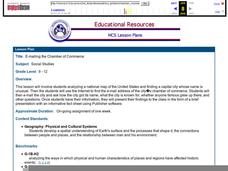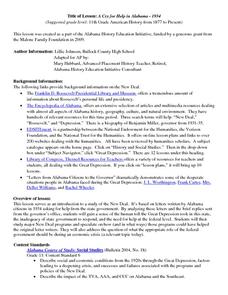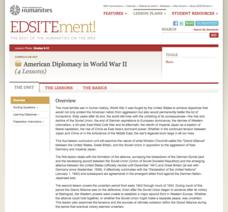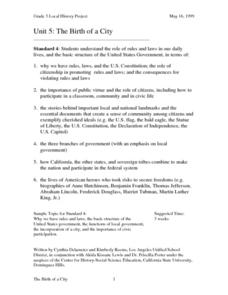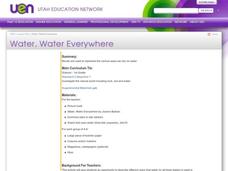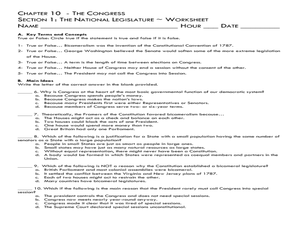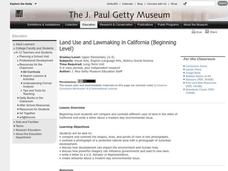Curated OER
E-mailing the Chamber of Commerce
Encourage effective internet research and e-mail correspondence as scholars investigate a US capital city they've never visited to find pertinent and relevant information. They begin by picking a city, then visit that city's chamber of...
Roy Rosenzweig Center for History and New Media
Reconstruction
When slavery ended, what did the government do to help African American during Reconstruction? An interesting instructional activity uses primary sources such as newspaper articles to help scholars analyze Reconstruction policies and how...
Curated OER
The Great Depression and Everyday Life
Examine everyday life during the Great Depression, as well as the effects if the Depression on American population, society, and economy. Learners write who, what, where, when, and why summaries of a person who relocated to California...
Alabama Department of Archives and History
A Cry for Help in Alabama - 1934
What should be the role of the federal government during an economic crisis? That is the question at the center of this introduction to a study of the New Deal. Class members examine letters to the state government asking for help,...
DocsTeach
"We Are Badly in Need of a Breath of Fresh Air": A Letter to President Kennedy About LGBTQ+ Rights
The 1960s were a pivotal time for many Americans who had long been discriminated against. Scholars read a document addressed to President Kennedy in support of LGBTQ+ rights and why they are essential. The activity includes group...
National Endowment for the Humanities
American Diplocmacy in World War II
The end of World War II saw the world deeply changed over the last few years. Four thorough lessons explore post-war Europe, America, and Asia through reading assignments and discussion questions about the Grand Alliance and the signing...
Curated OER
Separation of Powers
Eighth graders explore and explain the responsibilities and limits of our national system of government. After reading various selections documenting the viewpoints of the federalists and anti-federalists and the separation of power,...
Curated OER
Ratifying the Constitution
After a lecture on ratifying the Constitution, this worksheet would be perfect to reinforce your government (or U.S. History) learners' new knowledge. The activity contains ten knowledge-level and comprehension-level questions. This...
Curated OER
The Birth of a City
Third graders understand the role of rules and laws in our daily lives. They research the basic structure of the United States government. They participate in a simulated City Council meeting.
Curated OER
Water, Water Everywhere
First graders study water-its properties, its 3 states, and the way we rely on it for everyday living. They read Water, Water Everywhere, draw murals of where they have seen water and the ways they use it and eat/drink snacks that are...
Curated OER
Congressional Scenarios
In this U.S. government worksheet, students read 12 scenarios pertaining to government intervention and determine what to do as lawmakers in response to each of the scenarios.
Curated OER
Parallel Timelines
Twelfth graders research the history of how a particular environmental issue moves through the Conservation Movement. They create timelines that show the progression of public sentiment and the legislation about the issue.
Curated OER
The National Legislature: ch 10
Answering comprehension questions during or after reading an informational text can help focus the reader's attention. Here are 5 True/False and 5 multiple choice questions related to the Congress, bicameralism, and basic governmental...
Curated OER
State of Mind: Inventing the American Identity
Students define national identity, explain importance of having national identity, describe America's national identity, work together and formulate class vision of what America's national identity is, identify United States symbols and...
Curated OER
Book: Latino Economics in the United States: Job Diversity
Students, after reading Chapter 1 in the book, "Latino Economics in the United States: Job Diversity," write an essay that compares the cultural as well as the historical factors (experiences with jobs, discrimination, education, etc.)...
Curated OER
The Government and Natural Rights
Students are introduced to some basic ideas the Framers used in creating the kind of government they thought would best protect the natural rights of each individual and promote the good of all. At the conclusion of the lesson, they know...
Curated OER
Let Me Tell You About My State
Students develop an awareness of the concepts of the United States through the Amateur Radio communication services by verbally sharing information about their state such as cultures, current events, geography, history and much more.
Curated OER
Branches of Government Graphic
Students explore the three branches of government. They create a graphic diagram to show each branch of government. Students include the qualifications for service and duties of each branch of government in their graphic diagram.
K12 Reader
Responsibilities of Citizenship
Your pupils are all citizens of your classroom. Provide some more instruction on how people can be citizens with the reading passage included here. After reading, learners answer the five related questions.
Curated OER
Land Use and Lawmaking in California
Students investigate the laws of using land. In this California Government instructional activity, students examine the many uses of land in California and find an environmental issue they care about. Students write a letter...
Curated OER
Differences and Settlement in Framing the United States Constitution
Students identify the principles of democracy when framing the United States Constitution. In groups, they analyze the differences that were settled before anyone signed the document. They role play their own activity in which they...
Curated OER
How Man Negotiates Away His Natural Freedom
Students recognize that our legal-political system hasdeveloped through a process of moving from philosophical ideals to compromised working models. They apply John Locke's views to the development of U.S. political theory and systems.
Smithsonian Institution
Mobilizing Children
Scholars find out how the government used propaganda to mobilize children to help in the war effort. Lesson exercises include analyzing a quote from Franklin Roosevelt, viewing propaganda images and posters, and participating in a lively...
Curated OER
Where Do You Stand?
Scholars assess a government's ability to intervene in personal health decisions. They research basic facts about euthanasia and describe their opinions about new legislation passed in the United States Congress about an individual's...
